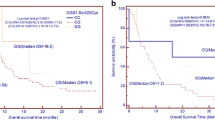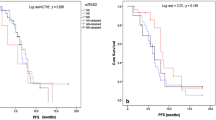Abstract
Introduction
Lung cancer is the leading global cause of cancer-related mortality and is associated with poor prognosis. To improve survival rates of lung cancer patients, better understanding of tumorigenic mechanisms is necessary, which may lead to development of new therapeutic strategies. The hOGG1 and NTH1 genes act in the DNA BER repair pathway and their involvement in lung cancer pathogenesis has been analyzed in several populations.
Methods
We analyzed targeted regions of the hOGG1 and NTH1 genes in 96 Brazilian patients with non-small-cell lung cancer (NSCLC) and 89 cancer-free, ethnically matched controls.
Results
The NTH1 c.98G>T polymorphism rs2302172 (p = 0.02 and p = 0.02 for allele and genotype frequency between cases and controls, respectively) and the 140-17C> T variant (rs2233518) (p = 0.02 and p = 0.02 for allele and genotype frequency between cases and controls, respectively) were detected in four lung cancer cases (4 %) while the NTH1 Q131K (C391A) polymorphism was found in seven lung cancer cases (7 %) (p = 0.001 and p = 0.008, for allele and genotype frequency between cases and controls, respectively). None of these sequence variants were detected in controls. The Ser326Cys (C1245G, rs1052133) polymorphism in the OGG1 gene was detected in 42 % of analyzed NSCLC patients and in 34 % of the controls (p = 0.11 and p = 0.25 for allele and genotype frequency between cases and controls, respectively).
Conclusions
Our study provides preliminary evidence that polymorphisms in OGG1 do not contribute to development of NSCLC in Brazilian patients and that NTH1 polymorphisms may be associated with NSCLC pathogenesis.
Similar content being viewed by others
References
Torre LA, Bray F, Siegel RL, Ferlay J, Lortet-Tieulent J, Jemal A. Global cancer statistics, 2012. CA Cancer J Clin. 2015;65:87–108.
Hecht SS, Szabo E. Fifty years of tobacco carcinogenesis research: from mechanisms to early detection and prevention of lung cancer. Cancer Prev Res. 2014;7:1–8.
Duan WX, Hua RX, Yi W, Shen LJ, Jin ZX, Zhao YH, et al. The association between OGG1 Ser326Cys polymorphism and lung cancer susceptibility: a meta-analysis of 27 studies. Plos One. 2012;7:35970.
Hecht SS. Lung carcinogenesis by tobacco smoke. Int J Cancer. 2012;131:24–32.
Krishnan VG, Ebert PJ, Ting JC, Lim E, Wong SS, Teo AS, et al. Whole-genome sequencing of Asian lung cancers. Second-hand smoke unlikely to be responsible for higher incidence of lung cancer among Asian never-smokers. Cancer Res. 2014;74:71–81.
Peng Y, Li Z, Zhang S, Xiong Y, Cun Y, Qian C, et al. Association of DNA base excision repair genes (OGG1, APE1 and XRCC1) polymorphisms with outcome to platinum-based chemotherapy in advanced non small-cell lung cancer patients. Int J Cancer. 2014;135:2687–96.
Jacobs AC, Calkins MJ, Jadhav A, Dorjsuren D, Maloney D, Simeonov A, et al. Inhibition of DNA glycosylases via small molecule purine analogs. PLoS One. 2013;8:e81667.
Curtin NJ. DNA repair dysregulation from cancer driver to therapeutic target. Nat Rev Cancer. 2012;12:801–17.
Kim KY, Han W, Noh DY, Kang D, Kwack K. Impact of genetic polymorphisms in base excision repair genes on the risk of breast cancer in a Korean population. Gene. 2013;532:192–6.
Sevilya Z, Leitner-Dagan Y, Pinchev M, Kremer R, Elinger D, Rennert HS, et al. Low integrated DNA repair score and lung cancer risk. Cancer Prev Res. 2014;7:398–406.
Wallace SS. Base excision repair: a critical player in many games. DNA Repair. 2014;19:14–26.
Wallace SS, Murphy DL, Sweasy JB. Base excision repair and cancer. Cancer Lett. 2012;327:73–89.
Wang LE, Gorlova OY, Ying J, Qiao Y, Weng SF, Lee AT, et al. Genome-wide association study reveals novel genetic determinants of DNA repair capacity in lung cancer. Cancer Res. 2013;73:256–64.
Robertson AB, Klungland A, Rognes T, Leiros I. Base excision repair: the long and short of it. Cell Mol Life Sci. 2009;66:981–93.
Leitner-Dagan Y, Sevilya Z, Pinchev M, Kramer R, Elinger D, Roisman LC, et al. N-Methylpurine DNA glycosylase and OGG1 DNA repair activities: opposite associations with lung cancer risk. J Natl Cancer Inst. 2012;104:1765–9.
Qian B, Zhang H, Zhang L, Zhou X, Yu H, Chen K. Association of genetic polymorphisms in DNA repair pathway genes with non-small cell lung cancer risk. Lung Cancer. 2011;73:138–46.
Kazma R, Babron MC, Gaborieau V, Génin E, Brennan P, Hung RJ, et al. Lung cancer and DNA repair genes: multilevel association analysis from the International Lung Cancer Consortium. Carcinogenesis. 2012;33:1059–64.
Yamane A, Kohno T, Ito K, Sunaga N, Aoki K, Yoshimura K, et al. Differential ability of polymorphic OGG1 proteins to suppress mutagenesis induced by 8-hydroxyguanine in human cell in vivo. Carcinogenesis. 2004;25:1689–94.
Janik J, Swoboda M, Janowska B, Cieśla JM, Gackowski D, Kowalewski J, et al. 8-Oxoguanine incision activity is impaired in lung tissues of NSCLC patients with the polymorphism of OGG1 and XRCC1 genes. Mutat Res. 2011;709–710:21–31.
Le Marchand L, Donlon T, Lum-Jones A, Seifried A, Wilkens LR. Association of the hOGG1 Ser326Cys polymorphism with lung cancer risk. Cancer Epidemiol Biomarkers Prev. 2002;11:409–12.
Radak Z, Goto S, Nakamoto H, Udud K, Papai Z, Horvath I. Lung cancer in smoking patients inversely alters the activity of hOGG1 and hNTH1. Cancer Lett. 2005;219:191–5.
Bravard A, Vacher M, Moritz E, Vaslin L, Hall J, Epe B, et al. Oxidation status of human OGG1-S326C polymorphic variant determines cellular DNA repair capacity. Cancer Res. 2009;69:3642–9.
Chang JS, Wrensch MR, Hansen HM, Sison JD, Aldrich MC, Quesenberry CP Jr, et al. Base excision repair genes and risk of lung cancer among San Francisco Bay Area Latinos and African-Americans. Carcinogenesis. 2009;30:78–87.
Galick HA, Kathe S, Liu M, Robey-Bond S, Kidane D, Wallace SS, et al. Germ-line variant of human NTH1 DNA glycosylase induces genomic instability and cellular transformation. Proc Natl Acad Sci USA. 2013;110:14314–9.
Lahiri DK Jr, Nurnberger JI. A rapid non-enzymatic method for the preparation of HMW DNA from blood for RFLP studies. Nucleic Acids Res. 1991;11:5444.
Deslee G, Adair-Kirk TL, Betsuyaku T, Woods JC, Moore CH, Gierada DS, et al. Cigarette smoke induces nucleic-acid oxidation in lung fibroblasts. Am J Respir Cell Mol Biol. 2010;43:576–84.
Paz-Elizur T, Krupsky M, Blumenstein S, Elinger D, Schechtman E, Livneh Z. DNA repair activity for oxidative damage and risk of lung cancer. J Natl Cancer Inst. 2003;95:1312–9.
Guan P, Huang D, Yin Z. Zhou. Association of the hOGG1 Ser326Cys polymorphism with increased lung cancer susceptibility in Asians: a meta analysis of 18 studies including 7592 cases and 8129 controls. Asian P. J Cancer Prev. 2011;12:1067–72.
Sampath H. Oxidative DNA damage in disease-insights gained from base excision repair glycosylase-deficient mouse models. Environ Mol Mutagen. 2014;55:689–703.
Zienolddiny S, Campa D, Lind H, Ryberg D, Skaug V, Stangeland L, Phillips DH, Canzian F, Haugen A, et al. Polymorphisms of DNA repair genes and risk of non-small cell lung cancer. Carcinogenesis. 2006;27:560–7.
De Ruyck K, Szaumkessel M, Rudder I, Dehoorne A, Vral A, Claes K, et al. Polymorphisms in base-excision repair and nucleotide- excision repair genes in relation to lung cancer risk. Mutat Res. 2007;631:101–10.
Kohno T, Kunitoh H, Toyama K, Yamamoto S, Kuchiba A, Saito D, et al. Association of the OGG1-Ser326Cys polymorphism with lung adenocarcinoma risk. Cancer Sci. 2006;97:724–8.
Zhou PT, Li B, Ji J, Wang MM, Gao CF. A systematic review and meta-analysis of the association between OGG1 Ser326Cys polymorphism and cancers. Med Oncol. 2015;32:472.
Zhong D, Li G, Long J, Wu J, Hu Y. The hOGG1Ser326Cys polymorphism and increased lung cancer susceptibility in Caucasians: an updated meta-analysis. Scientific Reports. 2012;2:548.
Li H, Hao X, Zhang W, Wei Q, Chen K. The hOGG1 Ser326Cys polymorphism and lung cancer risk: a meta-analysis. Cancer Epidemiol Biomarkers Prev. 2008;17:1739–45.
Vogel U, Nexo BA, Wallin H, Overvad K, Tjønneland A, Raaschou-Nielsen O. No association between base excision repair gene polymorphisms and risk of lung cancer. Biochem Genet. 2004;42:453–60.
Kiyohara C, Takayama K, Nakanishi Y. Lung cancer risk and genetic polymorphisms in DNA repair pathways: a meta-analysis. J Nucleic Acids. 2010;4:59–71.
Wei W, He XF, Qin JB, Su J, Li SX, Liu Y, et al. Association between the OGG1 Ser326Cys and APEX1 Asp148Glu polymorphisms and lung cancer risk: a meta-analysis. Mol Biol Rep. 2012;39:11249–62.
Travis WD, Brambilla E, Riely GJ. New pathologic classification for clinical practice and clinical trials. J Clin Oncol. 2013;31:992–1001.
Acknowledgments
We are grateful to all patients.
Author contributions
Drs. L. De Marco, E. Friedman and M. A. Bicalho designed the study and applied for Research Ethics Board approval. Drs. A. J. Bicalho, F. B. Leidenz, M. A. Bicalho, L. Bastos-Rodrigues and Mrs. P. G. Couto recruited the patients and collected the data. Drs. L. Bastos-Rodrigues and Mrs. P. G. Couto analyzed the data and prepared draft figures and tables. Mrs. P. G. Couto prepared the manuscript draft with important intellectual input from Drs. L. De Marco and E. Friedman. All authors approved the final manuscript.
Author information
Authors and Affiliations
Corresponding author
Ethics declarations
Conflict of interest
The authors declare that there are no conflicts of interest.
Funding
This work was partially funded to L. De Marco by Conselho Nacional de Desenvolvimento Científico e Tecnológico (CNPq # 405053/2013-4) and Fundação de Amparo à Pesquisa de Minas Gerais (FAPEMIG # APQ-00220-14), Brazil.
Ethical approval and informed consent
The Ethics Committee of Universidade Federal de Minas Gerais approved this study (ETIC 473-05). All subjects signed an informed consent.
The manuscript does not contain clinical studies or patient data and followed the Declaration of Helsinki guidelines.
Rights and permissions
About this article
Cite this article
Couto, P.G., Bastos-Rodrigues, L., Carneiro, J.G. et al. DNA Base-Excision Repair Genes OGG1 and NTH1 in Brazilian Lung Cancer Patients. Mol Diagn Ther 19, 389–395 (2015). https://doi.org/10.1007/s40291-015-0164-1
Published:
Issue Date:
DOI: https://doi.org/10.1007/s40291-015-0164-1




